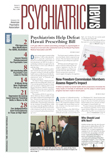The overwhelming majority of attendees at last fall's APA Institute on Psychiatric Services (IPS) in San Diego said that the sessions met their educational objectives and incorporated up-to-date research findings, according to an analysis of the evaluation forms turned in by attendees.
Though IPS attendance was somewhat lower than in recent years, this did not dampen the enthusiasm of meeting attendees—about 97 percent of those who completed an evaluation of the meeting (394) rated the IPS sessions as“ excellent.”
IPS attendance was 1,412, and when exhibitors, press, staff, and unregistered faculty were included, there were 1,156 attendees. More than 150 sessions were offered in a variety of formats, including multimedia sessions, which used film and video as teaching tools.
Crucial topics on which IPS sessions focused included assertive community treatment, homelessness, cultural competency, and HIV/AIDS psychiatry, which all fit well with the meeting's theme, “Recovery and Community.”
The trainee session “Clinical Approaches to Working With People Who Are Homeless and Have Mental Illness: Challenges and Rewards” was supported by the Center for Mental Health Services, National Resource and Training Center on Homelessness and Mental Illness, and the Department of Psychiatry at the State University of New York, Downstate Medical Center. The session, which drew 60 attendees, also reflected the meeting's theme.
The meeting also featured for the first time an afternoon-long gala titled“ Celebration Recovery,” which included presentations, art exhibits, and music and drew hundreds of meeting attendees and mental health consumers from Southern California.
A report from APA's Department of Continuing Medical Education (CME) compiled information about registrants and their impressions of the meeting. Kathleen Debenham, M.A., who is director of that department, prepared the report.
“Active participation by community psychiatrists in planning the institute and introducing sessions such as Celebration Recovery contributed to the vitality of the meeting,” Debenham said. “Overall, attendee response was upbeat and positive.”
General evaluation forms were placed in all registration packets and distributed at a variety of locations. A computerized evaluation survey allowed registrants to complete the evaluation online. In addition, forms were mailed after the meeting to those who did not respond on site.
With the Web-based evaluation system, attendees can now complete their evaluation at the computer center on site, from their hotel, or at home after the meeting.
The evaluation program also generates a personalized certificate of attendance once the evaluation is completed.
About 97 percent of respondents to the evaluation agreed that the sessions met their educational objectives, and the same proportion agreed that multiple views were presented at the industry-supported symposia.
According to the evaluation results, 72 percent of the respondents were psychiatrists. Psychologists, social workers, occupational therapists, and nurses made up 17 percent of respondents. Nearly two-thirds of attendees (65 percent) cited patient care as their primary professional activity. About 16 percent of respondents said that they worked in administrative capacities.
Support from California district branches contributed to the substantial participation in the San Diego meeting; California attendees numbered 271, according to Debenham, and 118 were APA members.
After reviewing evaluation scores and comments, Department of CME staff made several recommendations for the 2006 institute. These recommendations include continued involvement of the Scientific Program Committee with the local district branch and its members early in the development of the meeting and capitalizing on access to local resources for IPS faculty.
The 2006 Institute on Psychiatric Services will be held from October 5 to 8 in New York City. More information is posted online at<www.psych.org/edu/ann_mtgs/ips/06/index.cfm>.▪
